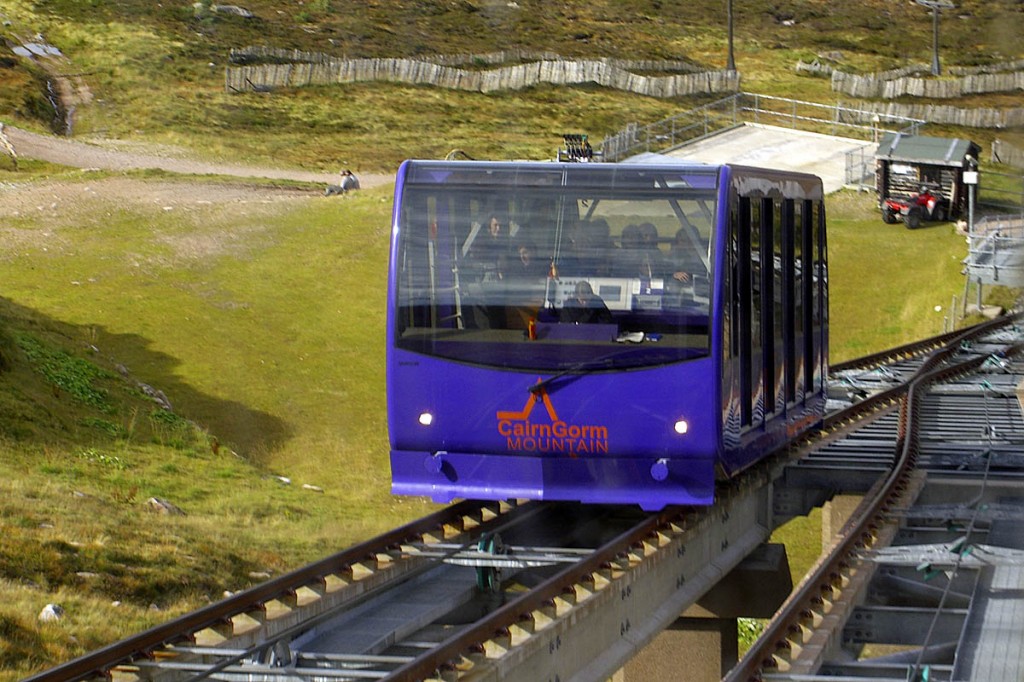A controversial funicular railway on Cairn Gorm will not reopen in time for this winter’s skiing season, its owners announced.
Highlands and Islands Enterprise blamed the Covid-19 crisis and unseasonal blizzards as some of the reasons for missing the targeted date for the service’s reintroduction.
The Scottish Government’s development agency, which took back responsibility for maintaining the funicular after the company running it went into administration in 2018, also cited technical problems on repairing the structure for the delays.
HIE said: “The current phase of engineering works to strengthen the 1.9km viaduct that supports the railway track began in April 2021, with the aim of returning the funicular to service early next year.
“However, despite strong progress made in tough conditions, HIE has concluded that the planned timescale now needs to extend into the second half of 2022.
“The mountain resort will stay open throughout winter, with skiers and snowboarders able to access the slopes using nine ski tows that will run every day when weather conditions are suitable.”
The funicular railway was opened on the UK’s seventh-highest mountain on Christmas Eve 2001 at a cost of £20m. About 300,000 visitors use the line each year for both snowsports and outdoor pursuits. The facility is the highest mountain railway in Britain. It closed in October 2018 to allow investigations into problems with the structure that supports the funicular.
The closure of the railway caused cashflow problems for CairnGorm Mountain, the company running the funicular, leading to it being placed into administration.
HIE interim chief executive Carroll Buxton said a combination of challenges made rescheduling the repair works inevitable.
She said: “Cairngorm Mountain Estate is a great visitor attraction that plays an important role in the local economy.
“The funicular has been a key element of what draws people to Cairn Gorm and it will be again, once these works are completed.
“We’ve always been upfront in describing the reinstatement programme as one of the most complex and difficult civil engineering projects in Scotland.
“As well as managing technical challenges, the team has to take great care to protect the mountain environment, and deal with difficult terrain and extreme weather conditions that can quickly become hazardous.
“The original schedule was very ambitious, even without the impacts of the pandemic lasting as long as they have and before the more recent problems in sourcing construction materials of suitable quality.
“With limited time available to complete these works before winter, postponement has become inevitable.”
In 2019 voluntary groups, including Ramblers Scotland, called for the funicular to be dismantled.
A coalition of groups said downhill skiing should be developed on ‘a light and lean’ basis and could be confined to Coire Cas, with modern ski lifts ending below the top of the plateau where it said frequent high winds make skiing unpleasant.
“A more compact ski area would allow snow making to be used to best advantage,” it said.
“Native trees should be planted widely to enhance the environment, reduce the visual impact and improve the skier experience, particularly in low cloud.
“As climate change is likely to make skiing conditions increasingly unpredictable, more bad weather alternatives should be developed in Speyside,” it said.
“A Centre for the Mountain Environment could be built, learning from the success of the Eden Project in Cornwall.”
HIE said more detailed inspection and design work followed before the decision to reinstate the funicular was announced last October by the Scottish Government, as part of a £20.5m business case to strengthen Cairngorm Mountain’s year-round appeal.
It said it had assessed alternatives to reinstatement before reaching its conclusions, including removing the structure, and replacing it with alternative uplift.
“We’re now working with our designers and contractors on a revised schedule for the remainder of the project,” Ms Buxton said.
“Harsh mountain conditions mean that all work will need to halt over winter and resume next spring. To ensure safety, there also needs to be a period of testing and certification at the end of the programme, so our current expectation is that the funicular can be relaunched in autumn 2022.
“Clearly, a longer timescale will also have a financial impact. We’ll be reviewing costs very carefully and will publicly confirm a revised budget as soon as it’s possible to do so.”
The agency said it has also approved up to £780,000 for a refurbishment of the Ptarmigan building that sits on the plateau and includes the UK’s highest restaurant, a shop, exhibition space and viewing platforms.
Beauly-based Simpson Builders has been awarded the contract after a competitive tender. HIE said the refurbishment is due to start at the end of August and be completed by the end of 2021.
